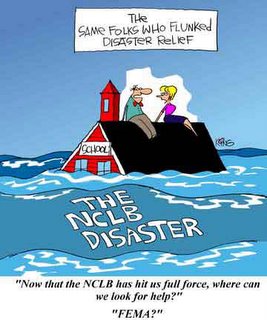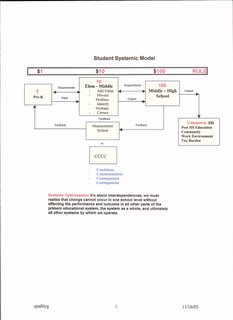
OK, Michigan Department of Education now I am really confused. I have blogged many posts on a variety of topics concerning the status of education in Michigan.
Many educators and parents have even responded by Email thanking me for some additional information. Last week I started to read the Department of Educations "School Report Card." It can be found at
MI School Report Card under current topics. I would advise you to print out the reports listed because you will go crazy trying to figure out what it all means.
In Saturday's Detroit Free Press it looks like a number of their writers tried to report the findings, they even got some quotes that really don't help, they just support the positive twist of the title "
359 schools rise from failing list" State gives out more A's, B's this year."If you glanced at the title you might think schools are improving. Based on my reading Friday at the state site I did not get the same impression. The article even states "
While the state gave out more A's and B's this year, the number of schools getting the poorest grades of D-Alert and Unaccredited is also on the rise."I don't blame the reporters, I'm sure they were just reporting what someone told them. By the time you get done reading all this stuff it's hard to tell which is which and do they support the same goals.The Michigan accreditation system is named
"Education YES, A Yardstick for Excellent (
qg says ... please define excellent school)
Schools" and The federal program is named "Adequate (
qg says... please define adequate) Yearly Progress (AYP)," under the federal No Child Left Behind Act (NCLB). Together they make up the Michigan's school accountability system.
I learned this by reading the "Guide to Reading the Michigan School Report Cards 2005 Edition" at
Guide to Read School Report Cards. I have many questions concerning this document like I had about the others I posted, but I'm not going to respond until some other questions get answered from previous posts. The following posts range from April to August of this year:
click on the following:
qualityg again responds to Michigan School Improvement FrameworkMI State Education Plan for 2005 - 2010
MEAP Scores Improving? No more HS Grad PartiesEducation - A Nation & State at RiskLt. Gov Cherry task force - Raise Michigan StandardsMichigan Higher Education: Promise or DreamMichigan Education: here we go again Hope you are still with me because it gets more confusing as I try to understand our education system from end-to-end (systems thinking). There are at least four major initiatives all going on at the same time (Lt. Gov Cherry Task Force, Michigan School Improvement Framework, MEAP scores special meeting task force, and AYP's school report card,). I'm sure there are others too. The best I can tell different groups/departments are running with these initiatives.

From a quality perspective I had hoped all the initiatives would be found in the Strategic Plan 2005 - 2010. Some are mentioned and some are not. I'm sure the associated detailed project plan that accompanies the Strategic Plan identifies those responsible for each project and the improvement plans that go with each one. It should also show overlaps and how each effort is interdependent on the other for success. Geez, I sure hope they are NOT independent efforts because then you have improved nothing and we have made another very costly effort (by the way I have been asking about dollars, where are they coming from and how much for each initiative)?
Please someone tell me who is coordinating all these efforts. The Michigan School Report Card reminds me of "Management by Objectives (MBO)," and some of you know how I feel about those business plagues. Some indicators are mentioned but others are not to be found, you assume by constantly adjusting and changing scores, variables, etc. that it helps (you are tampering), you are wrong, you think you are driving forward, you are not because your eyes are on the back of your head looking back.
Your results are based on Standardized tests and requirements (MBO), but the means by which schools obtain them are left to the individual schools and districts (you may think they are standardized but they are not, C'mon be honest). You mention best practice with no examples; you talk about snapshots, when you need a movie. I could go on, but I won't for now.
The saddest part of all is that many teachers and parents have no idea what is going on, how can you expect them to work toward moving targets, different objectives and not one common aim for our educational system. The one common aim is our children, lets have one common effort, this doesn't mean one initiative.
Aw, C'mon now, this is ridiculous, isn't it?

updated 8/29/05
Here is a link to an article in today's Detroit Free Press by Lori Higgins.
Don't Stop now, Gov tells schools
qualityg says... I think Mr. Chuck Wilbur may be on the right track, too soon to tell.
updated 9/16/05
Governor Calls for Mandatory Statewide Curriculum
Says Education is Critical to State's Economy
LANSING: In her weekly radio address, Governor Jennifer M. Granholm today said establishing a rigorous mandatory curriculum for Michigan high school students is critical to the state's economic future. She also thanked the State Board of Education for moving forward on her call to establish higher standards for Michigan's high school students.
"With Michigan's economic future on the line, we can't afford to have our 500 local school districts marching in different directions," Granholm said. "Instead, we need a high standard, mandatory curriculum to get all our students on the road to higher education and a good paying job."
The State Board of Education is scheduled to unveil curriculum recommendations in mid-November.
Creating a statewide curriculum is another step toward reaching Granholm's goal of ensuring that more students are prepared for jobs of the future. She has called for a doubling in the number of college graduates in Michigan in the next ten years.
"I believe strongly in putting a degree in the hands of every single child," Granholm said. "To do that, we have to improve education at every level in Michigan. And by doing so, we'll help prepare our students for success in school, success in college, and we'll help our economy succeed."
The Governor noted that states with the highest number of college graduates are also the states with the lowest unemployment rates and strongest economies. While other states and countries have adopted requirements in critical fields like science and math, Michigan does not require a single course, other than civics, to graduate from high school. Creating a mandatory curriculum in these critical fields is an essential step in ensuring Michigan is the most well educated state in the nation and an engine for knowledge based job creation.
Earlier this year, Governor Granholm signed legislation that will require high school students, starting with the class of 2008, to take a nationally recognized college entrance exam, such as the ACT or SAT, instead of the MEAP test. She also proposed increasing funding for K-12 education to record levels.

By Mike Thompson - Detroit Free Press
qualityg says... By What Method where the "mandatory curriculum" created? And, if you really want to have more degrees you need state funding for Pre-K - 16.
Getting just a High School Dipolma is no longer acceptable (get rid of high school graduation), be bold govenor, lead the way to a new "Paradigm" about education, forget politics and do what is right.
Unveil (where will the ceremony be held)? Curriculum recommendations? Will that be the "New Michigan School Improvement Framework?
updated 9/21/05
I just wanted to let everyone know I am receiving feedback from the Governor's office about many of the questions I have been raising. Here is some additional info that I received in an Email yesterday.
Thank you for writing to Governor Granholm's office. I will be expressing your thoughts to the Governor and her Executive Staff.
The State Board of Education will be seeking input on what the needs and priorities of education are for the state. They will be having public meetings and asking for involvement from businesses, education authorities and the general public. I believe that their first meeting is on October 1st. They will post meetings on the website that can be located at: http://www.michigan.gov/md
updated 10/30/05

I recently received an email from an educator in Oregon who wanted to know if I believed in the No Child Left Behind Act (NCLB).
For those not familiar with NCLB,
For at least ten decades, American educators have failed to come up with the right and wrong way of teaching and learning. The best minds at all levels of academia have struggled with these questions.
NCLB was developed on the theory of "what's good for business is good for schools." School productivity would improve if business principles and applications were applied. If I remember correctly this is what was stated by then Texas governor George W. Bush and in Houston by Superintendent Rod Paige. If such improvements could happen in Texas, then they could happen everywhere in America.
There are many articles written on whether or not Texas indeed get better because of their standards. I do not have enough knowledge to agree or dispute those facts. However, …
Following are the problems I have with NCLB based on my facts and data:
First, let's address "what's good for business is good for schools." What businesses were used as models? The ethics and values that ran Enron, Delphi, Adelphia, Arthur Anderson, WorldCom, Tyco, HealthSouth and others (see qualityg’s write-up on -- CEO Fools that include examples of destructive leadership in action)? How about the mismanagement at AT&T that destroyed an icon. What about the automakers and their suppliers who are going bankrupt because of there continued short-term focus on quarterly results. I know let’s use our MBA Programs for how to do things right. Whoopsy, we have been doing that too and they are leading many of the before mentioned companies.
The last time I read over the act I was intrigued to find the Act stated “If a school fails to make test gains in two successive years, the school can be labeled a failing school and the school's administrators must write an extensive (100+pages) school improvement paper to justify their job and school.
I’m not against school administrators writing improvement plans, but I question the validity of any test that only concentrates on a critical few (reading, math, science) and neglect the useful many (art, music, physical education, drama, play). Why does the plan have to be 100+ pages? Perhaps that is all that can fit on the white board (write - I will get better because I can, over and over).
How many schools are failing in your State? Do you know do you care? When I went to Michigan’s Education site Assessment & Accountability I found all sorts of assessments (MEAP, Education Yes, Merit Exams, Michigan School Report Card, MI-Access, National Assessment of Educational Progress and there are more). I could not find any schools that have failed the NCLB. If anyone knows of a school I would be very interested in reading their 100 + page report. Double-spaced and in APA style format please!
All I can find are programs that measure what we are doing wrong, but none that display the standardized procedures that should tell us what to do correctly.

I was wondering who does the assessing for all these programs? There must be an army of assessors invading the schools weekly. At what cost does the state tax payer’s pay for all these programs. Who does the follow-up assessment?
In summary, I’m all for test and theory, but NCLB and other state programs have failed, time to move to the next one. Learn from the others and bring what was right forward and leave the rest behind. One more thing – Government need not apply to help!
Here is an added bonus for your review. Please go to MI Fed Educ Budget 2006. Is it just me or does the middle class continued to get hosed when it comes to Federal and State Aid?
To check your state go to State fact sheet fed budget 2006.

updated 11/05/05
Granholm Urges Citizens to Complete College Degrees
Proclaims November “Return to Learn” Month
“Michigan’s incredible network of universities, colleges and community colleges is really stepping up to the plate with “Return to Learn” month,” said Granholm after taping her address. “Together, we are going to make sure people across our state know that the barriers to finishing a college degree are few, but the rewards are great.”
qualityg says... It's a start, but c'mon, "barriers are few"?
For the complete proclamation got to http://www.michigan.gov/gov
updated 11/07/05
QUALITY OF EARLY CHILDHOOD EDUCATION (PRE-K)?
From a business view many of the organizations in the United States realize that Quality must be built in the design stage in order for a product or service to have a chance in the competitive marketplace.
From an educational system point of view this has yet to be understood. Many provide lip service but most have no idea on how to implement such a program or as to where they should start. To start --> Pre-K to at least 3rd grade should get the majority of funds for designing the best standardized quality requirements and teachers that can be developed.
Implementing standardized requirements at the end of the process (12th grade) are called Quality Results. You cannot manage by Quality Results; you need to manage by Process Indicators throughout the educational process. Waiting until the end is too late, too costly and too wrong.
I'm not against them, just against them if they are stand-alone. Implementing requirements only at the high school level will bring out nay sayers that say too many kids will drop out because of the strictness and difficulty of the tests. Yes, if you wait until the end it indeed will happen, save them up front where it counts, provide them multiple opportunities through the early years to catch up and get help. Waiting to the end is just plain SILLY!
It is no different than business, children will not be able to compete in the global marketplace without Quality being built and designed in up front in the system.
updated 11/13/05
In Sunday's Detroit Newspaper (11/12/05) the following article appeared. Uncanny isn't it (see blog post directly above)? I like the concept and I really like the fact they are including all disciplines.
However, Mr. Flanagan and the state educational officials are still looking at a piece of the educational puzzle and not the whole. Also, By what methd will this be rolled out? Do we have an adequate amount of math teachers skilled enough to meet the new standards? Will all of the other programs that school districts are supposed to implement be changes to include this new standard (there is enough confusion already).
16 classes or forget a diploma
State wants to require more math, science to get high school students ready for work world.
Here is the complete story: 16 classes - Diploma
qualityg says... please review "Student Sytemic SIPOC Model" (by qg - 1993)
Click on picture twice (2) to enlarge

qualityg says ... If you study my model you can easliy see the cost to improve the educational system costs much less up front than to try and fix the problem towards the end.
It will be interesting to see the comments and local school commitees that are formed to fight this educational mandate stated by Mr. Flanagan. Many parents will challenge the strictness and difficulty of the standard simply because they don't have the knowledge to help their children at home and it will be too costly to get additional help if their local school teachers and administration are not up to the task.
Warning - I have already heard some high school teacher say they should be compensated more because all the burden of standards falls on to their shoulders.
OH MY! We have a long way to go Mr. Flanagan.

 qualityg says ... Like I said this is not AT&T, it's just a company pretending... What is the purpose of the baby letters? The circle looks like one of those fancy white chocolate candy balls. Looks good on the outside until you take a bite and spit it out.
qualityg says ... Like I said this is not AT&T, it's just a company pretending... What is the purpose of the baby letters? The circle looks like one of those fancy white chocolate candy balls. Looks good on the outside until you take a bite and spit it out.
 VS
VS 













































